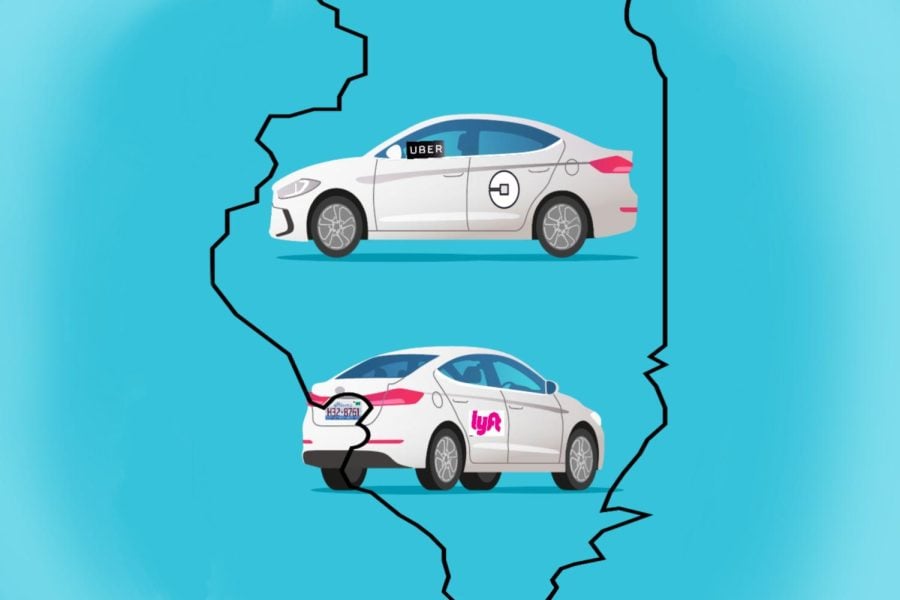As Illinois bill proposes holding ride-share companies to new standards, some drivers call for their own protections
The Illinois State Legislature is considering a bill that would hold ride-share companies like Uber and Lyft liable in the case of damages.
May 2, 2023
Content warning: This article includes mentions of sexual assault.
In March, the Illinois House of Representatives passed a bill that would remove liability protections for ride-share companies such as Uber and Lyft.
Illinois does not currently classify ride-share drivers as “common carriers” like train conductors, airline pilots and taxi drivers. That means if a rider sues a driver, the company will not be held liable for any damages. The proposed legislation would remove this exemption.
State Rep. Jennifer Gong-Gershowitz (D-Glenview), the House sponsor of the bill, said current legislation must be reformed to reflect the modern transportation market.
“Today, I think it is very clear that rideshare apps are as common and ubiquitous as every other common carrier,” Gong-Gershowitz said. “So it doesn’t make sense that the public wouldn’t be able to rely on a rideshare company being held to the same standard as every other common carrier.”
The bill currently awaits a vote in the Illinois Senate, scheduled for Wednesday.
This legislation follows an Illinois court case about ride-share safety settled in 2022, Doe v. Lyft. A woman in Chicago alleged her Lyft driver sexually assaulted her during a ride in 2017. She sued Lyft, her driver and Sterling Infosystems, Inc., the company Lyft uses for background checks.
In response, Lyft argued the company is not liable for the driver’s actions under current law. An appellate court upheld this exemption, and the case was settled before the state Supreme Court could issue its ruling.
Some ride-share providers, however, say driver safety should be of more concern.
“We are in more danger than the passengers. We are inviting people into our car, into our lives,” said Matt Fischer, an Uber and Lyft driver in Chicago. “To say that passengers aren’t safe with us, it’s the other way around.”
Fischer said he opposes the proposed legislation because he thinks ride-share drivers function well as independent contractors. The new bill would take away driver’s autonomy with their work by classifying them in the same way as taxi drivers and other common carriers, he said.
Both Uber and Lyft have issued statements opposed to the legislation.
Brent Kent, a senior public policy manager at Lyft, said in a letter to Gong-Gershowitz that the company’s current safety regulations — which include yearly background checks of employees and features that allow passengers to share their location — ensure riders remain safe. The letter added that new standards would increase litigation costs for customers.
Uber said in statements to news outlets including WCIA and WTTW News that the bill would impact drivers’ ability to earn money. Illinois would become the only state to classify ride-share drivers this way.
The bill passed mostly along party lines, with some Republican state legislators voicing opposition to the bill. According to We Are Central Illinois, State Rep. Dan Caulkins (R-Decatur) called the legislation “another attack on the free market.” State Rep. Patrick Windhorst (R-Harrisburg) said on the House floor that increased regulation could drive Lyft and Uber away from Illinois.
Lenny Sanchez, the director of the Independent Drivers Guild of Illinois, said both Uber and Lyft have asked drivers to sign petitions opposed to the proposed legislation — a move he criticized as the companies’ battle, not theirs.
“We told drivers in our community to not sign that, not support it,” Sanchez said. “That’s the companies’ problem. That’s not our problem.”
Sanchez said he also hopes the legislation will lead to future protections for drivers to seek damages from the ride-share companies if they are injured by a passenger during a ride.
Nolberto Casas, political liaison for the Chicago Gig Alliance, said the new regulations of ride-share companies represent a step in the right direction — though more oversight of the ride-share companies would still be required.
“We are staunch supporters of (the bill), but we recognize it as a baby step,” Casas said. “It’s going to close the loopholes so that billion dollar corporations don’t get preferential treatment over people.”
Gong-Gershowitz said the new legislation is long overdue to hold ride-share companies accountable.
“These common carriers who currently enjoy a statutory protection from common carrier liability are refusing to accept responsibility,” Gong-Gershowitz said. “It is long past time to revisit how we perceive Uber and Lyft.”
Email: katewalter2025@u.northwestern.edu
Twitter: @katewalter03
Related Stories:
— Jennifer Gong-Gershowitz projected to win Illinois District 17 state Rep. race
— Chicago rideshare drivers express concerns amid COVID-19
— Gov. Quinn vetoes ‘Uber bill,’ prevents statewide rideshare regulations


